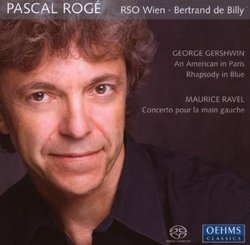| All Artists: Gershwin, Ravel, Roge, Rso Wien, De Billy Title: An American in Paris / Rhapsody in Blue (Hybr) Members Wishing: 0 Total Copies: 0 Label: Oehms Original Release Date: 1/1/2008 Re-Release Date: 3/25/2008 Album Type: Hybrid SACD - DSD, Import Genre: Classical Styles: Chamber Music, Forms & Genres, Concertos, Theatrical, Incidental & Program Music, Historical Periods, Classical (c.1770-1830), Instruments, Keyboard Number of Discs: 1 SwapaCD Credits: 1 UPC: 4260034866232 |
Search - Gershwin, Ravel, Roge :: An American in Paris / Rhapsody in Blue (Hybr)
 | Gershwin, Ravel, Roge An American in Paris / Rhapsody in Blue (Hybr) Genre: Classical
|
Larger Image |
CD DetailsSimilar CDs |
CD ReviewsA PARISIAN IN AMERICA DAVID BRYSON | Glossop Derbyshire England | 03/26/2009 (5 out of 5 stars) "Ravel and Gershwin had, the liner note starts by saying, more in common than appears at first glance. My reaction was - how many glances does it need? They knew each other well, they admired each other's work, and they even died in the same year, tragically early in Gershwin's case. I suppose the underlying question is whether Gershwin counts as 'classical'. 'Classical' is a very unsatisfactory term, it has always seemed to me. As an antonym for 'romantic' it does not work at all. In the present instance the implied opposite is jazz, which was a powerful influence on Ravel, a 'classical' composer in anyone's book. Gershwin's compositions are imbued with blues harmonies, to a greater extent than the music of Ravel or of Delius, but on my own simple view a fully written-out big-band number like An American in Paris has more in common with orchestral suites from contemporary classical masters like Delius or even Bartok than it has with most jazz combos.
I like the selection of three works here. An American in Paris is placed between the pieces with solo piano, and it lets us hear the Vienna RSO orchestra by itself. They seem to me to handle it very well, but it would be less than candid of me not to say that I have never listened to the work with the sort of attention that I have given to, say, the Jupiter Symphony. My ideas of it may be rather superficial, but for what they are worth I like the mixture of brash with delicate in this performance. The total effect may be a little more 'classical' than sometimes, but if so that suits me very well. There is a point to make regarding the recording here. Its quality is excellent, and I should think so too in the third millennium, but the volume level is oddly low in general, although not so low in this piece as it is in the two 'concertos'. No great problem, indeed no problem at all if your set has a volume-control, but I would advise a lower setting for An American in Paris than for the other two numbers. If you start at the beginning, your first impression will be created by the Rhapsody in Blue. I have already mentioned the low volume-level, and I suggest you hike it quite considerably. The word that comes to mind immediately is 'cool'. That clarinet glissando is very cool indeed, and I just love it done like this. The recorded quality helps, and it treats Roge very well too. He is balanced against the orchestra in much the way we would hear in a live concert performance, and this is still not as common as it ought to be in concerto recordings. Roge is another cool customer, and I suppose I could characterise his playing as very French. Otherwise I am having to turn to the Lexicon of Cliches for adjectives, and perhaps 'crystalline' and 'limpid' will do to convey the right impression. To my own ears, all most enjoyable. In the left-hand concerto, perhaps Ravel's finest composition, Roge's interpretation is the one I know best, as the LP version that I have retained of the work is his on a disc in combination with the two-handed concerto, the conductor being Dutoit. I still think that Dutoit does more impressive things with the powerful introductory section, but I have no real complaint with what I find here, and Roge goes about the solo part very much as he used to. His technical assurance is total, his tone is pellucid, his rhythm is delicate and sprightly - it is all the way it should be. The liner note by Andrea Seebohm is excellent, and how often do we find that? There are in addition biographical paragraphs on the soloist, on the young (well, 40-year-old) conductor and on the orchestra itself. This is an extraordinarily pleasant disc, but one remark quoted in the liner really stopped me in my tracks. This is a statement by one Stuckenschmidt (presumably a Mr Stuckenschmidt) that Ravel's music is suggestive of sexual intercourse. The interesting point is that this is something Ravel may never have experienced, although I must assume that Stuckenschmidt has, otherwise he should not be talking about it. The experience in question has indeed formed part of my own life's rich tapestry, but it has never reminded me of the music of Ravel, nor has the music of Ravel ever occurred to me in the course of the activity. I must consider, even at my late age, whether or not to put the matter to some further test. I just wish I had some heavyweight sexologists of my own to put up as counterweights to Stuckenschmidt, say perhaps Dr Heinz Kiosk assisted by Dr Melisande Fischbein." |

 Track Listings (4) - Disc #1
Track Listings (4) - Disc #1